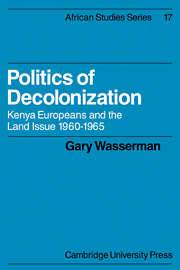Book contents
- Frontmatter
- Contents
- Dedication
- Acknowledgments
- Map
- Introduction: Kenya as a case study
- 1 Consensual decolonization: conditions, process, and the salient aspects of the Kenyan case
- 2 Background to decolonization: trends and groups in the European community
- 3 1960, initiating the bargain: the lobbying on the land issue and the dividing of the European community
- 4 1961, negotiating the bargain: accelerating the bargaining, deepening the divisions
- 5 1962, making the bargain: the resolution of the land issue and the dissolution of the European groups
- 6 1960–1970, sealing the bargain: the implementation of the Kenya land transfer schemes
- 7 Conclusion: Europeans, land and decolonization
- Notes
- Selected bibliography
- Index
5 - 1962, making the bargain: the resolution of the land issue and the dissolution of the European groups
Published online by Cambridge University Press: 04 August 2010
- Frontmatter
- Contents
- Dedication
- Acknowledgments
- Map
- Introduction: Kenya as a case study
- 1 Consensual decolonization: conditions, process, and the salient aspects of the Kenyan case
- 2 Background to decolonization: trends and groups in the European community
- 3 1960, initiating the bargain: the lobbying on the land issue and the dividing of the European community
- 4 1961, negotiating the bargain: accelerating the bargaining, deepening the divisions
- 5 1962, making the bargain: the resolution of the land issue and the dissolution of the European groups
- 6 1960–1970, sealing the bargain: the implementation of the Kenya land transfer schemes
- 7 Conclusion: Europeans, land and decolonization
- Notes
- Selected bibliography
- Index
Summary
… that in order to save its purse, it must forfeit the crown, and the sword that is to safeguard it must at the same time be hung over its head as a sword of Damocles.
Karl Marx, The Eighteenth Brumaire of Louis Bonaparte‘The crowning attainment of historical study’ is to achieve ‘an intuitive sense of how things do not happen.’
L. B. NamierThe establishment of a large land transfer program and its acceptance by the nationalists within the framework of a coalition government in 1962 stood as a monument to the success of the Europeans' bargaining, and as an epitaph for the groups. Pressure from the farmers had encouraged the British government's growing awareness that the land issue (and the fate of Kenyan decolonization and the European settlers) was not being resolved by their previous programs. The liberals' bargaining, in turn, assisted the rightward movement of the nationalists and their acceptance of the transfer schemes as well as coalition government. But at the same time, the conservatives and liberals had undermined their political rationale. The conservative groups had offered their followers a viable exit and by so doing had reduced the numbers of their supporters. The liberals having groomed their African successors had likewise fulfilled their role. The political climate of the African state further enhanced the demise of the European political groups and the representation of European interests through non-political associations.
- Type
- Chapter
- Information
- Politics of DecolonizationKenya Europeans and the Land Issue 1960–1965, pp. 105 - 134Publisher: Cambridge University PressPrint publication year: 1976



